|
|
 |

|
|
ABUNDANT GRACE
慕安德烈每日靈修 God's Best Secrets by Andrew Murray
Scripture: "The grace of our Lord abounded exceedingly with faith and love which is in Christ Jesus."—1 TIM. i. 14.
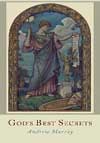
If we would value and love the Throne of Grace aright, we must try to understand what it is that it provides for our use. Scripture uses great words to reveal this grace to us. It speaks of "the riches of grace," "the glory of grace," "the abundance of grace," "the exceeding riches of grace," "the manifold riches of grace." Let these words sink deep into your hearts as we point to them in Gods Word. "Much more did the grace of God, and the gift by the grace of the one man, Jesus Christ, abound unto the many" (Rom. v. 15). "Much more shall they that receive the abundance of grace and of the gift of righteousness reign in life through the one, even Jesus Christ" (v. 17). "Where sin abounded, grace did abound more exceedingly" (v. 20). "By the grace of God, I am what I am: and His grace which was bestowed upon me was not found vain [powerless] ; but I labored more abundantly than they all: yet not I, but the grace of God which was with me" (1 Cor. xv. 10). "God is able to make all grace abound unto you; that ye, always having all suf¬ficiency in all things, may abound to every good work" (2 Cor. ix. 8). "To the praise of the glory of His grace, which He freely bestowed on us in the Beloved: according to the riches of His grace" (Eph. i. 6, 7). "But God, being rich in mercy, for His great love wherewith He loved us, quickened us together with Christ; that He might show the exceeding riches of His grace in kindness toward us in Christ Jesus" (Eph. ii. 4-7). What treasures are contained in these words! Let the Holy Spirit write them in your heart, that you may receive the full impression of the "exceeding riches" and the abundance of the glory of the grace to be received at the Throne of Grace. Let the thought take possession of you that all day long the abundance of grace will be granted to the soul who approaches with boldness, and is ready to receive from the sympathizing High Priest that which He has to bestow.

|
|
God Is Our Ally
信心的支票簿 Faith's check book
Scripture: "But if thou shalt indeed obey His voice, and do all that I speak; then I will be an enemy unto thine enemies, and an adversary unto thine adversaries" (Exodus 23:22).
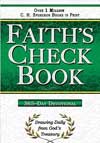
The LORD Christ in the midst of His people is to be acknowledged and obeyed. He is the vice-regent of God and speaks in the Fathers name, and it is ours implicitly and immediately to do as He commands. We shall lose the promise if we disregard the precept. To full obedience how large the blessing! The LORD enters into a league with His people, offensive and defensive. He will bless those who bless us and curse those who curse us. God will go heart and soul with His people and enter in deepest sympathy into their position. What a protection this affords us! We need not concern ourselves about our adversaries when we are assured that they have become the adversaries of God. If Jehovah has taken up our quarrel, we may leave the foemen in His hands. So far as our own interest is concerned we have no enemies; but for the cause of truth and righteousness we take up arms and go forth to conflict. In this sacred war we are allied with the eternal God, and if we carefully obey the law of our LORD Jesus, He is engaged to put forth all His power on our behalf. Wherefore we fear no man.

|
|
Morning, December 10
司布真日間靈修 Morning by Morning
Scripture: “So shall we ever be with the Lord.”(1 Thessalonians 4:17)

Even the sweetest visits from Christ, how short they are—and how transitory! One moment our eyes see him, and we rejoice with joy unspeakable and full of glory, but again a little time and we do not see him, for our beloved withdraws himself from us; like a roe or a young hart he leaps over the mountains of division; he is gone to the land of spices, and feeds no more among the lilies. “If to-day he deigns to bless us With a sense of pardoned sin, He to-morrow may distress us, Make us feel the plague within.” Oh, how sweet the prospect of the time when we shall not behold him at a distance, but see him face to face: when he shall not be as a wayfaring man tarrying but for a night, but shall eternally enfold us in the bosom of his glory. We shall not see him for a little season, but “Millions of years our wondering eyes, Shall oer our Saviours beauties rove; And myriad ages well adore, The wonders of his love.” In heaven there shall be no interruptions from care or sin; no weeping shall dim our eyes; no earthly business shall distract our happy thoughts; we shall have nothing to hinder us from gazing for ever on the Sun of Righteousness with unwearied eyes. Oh, if it be so sweet to see him now and then, how sweet to gaze on that blessed face for aye, and never have a cloud rolling between, and never have to turn ones eyes away to look on a world of weariness and woe! Blest day, when wilt thou dawn? Rise, O unsetting sun! The joys of sense may leave us as soon as they will, for this shall make glorious amends. If to die is but to enter into uninterrupted communion with Jesus, then death is indeed gain, and the black drop is swallowed up in a sea of victory.

|
|
Evening, December 10
司布真夜間靈修 Evening by Evening
Scripture: “Whose heart the Lord opened.”(Acts 16:14)

In Lydias conversion there are many points of interest. It was brought about by providential circumstances. She was a seller of purple, of the city of Thyatira, but just at the right time for hearing Paul we find her at Philippi; providence, which is the handmaid of grace, led her to the right spot. Again, grace was preparing her soul for the blessing—grace preparing for grace. She did not know the Saviour, but as a Jewess, she knew many truths which were excellent stepping-stones to a knowledge of Jesus. Her conversion took place in the use of the means. On the Sabbath she went when prayer was wont to be made, and there prayer was heard. Never neglect the means of grace; God may bless us when we are not in his house, but we have the greater reason to hope that he will when we are in communion with his saints. Observe the words, “Whose heart the Lord opened.” She did not open her own heart. Her prayers did not do it; Paul did not do it. The Lord himself must open the heart, to receive the things which make for our peace. He alone can put the key into the hole of the door and open it, and get admittance for himself. He is the hearts master as he is the hearts maker. The first outward evidence of the opened heart was obedience. As soon as Lydia had believed in Jesus, she was baptized. It is a sweet sign of a humble and broken heart, when the child of God is willing to obey a command which is not essential to his salvation, which is not forced upon him by a selfish fear of condemnation, but is a simple act of obedience and of communion with his Master. The next evidence was love, manifesting itself in acts of grateful kindness to the apostles. Love to the saints has ever been a mark of the true convert. Those who do nothing for Christ or his church, give but sorry evidence of an “opened” heart. Lord, evermore give me an opened heart.

|
|
Learning From Suffering
荒漠甘泉 Streams in the Desert
Scripture: "If I am in distress, it is in the interests of your comfort, which is effective as it nerves you to endure the same sufferings as I suffered myself. Hence my hope for you is well-founded, since I know that as you share the sufferings you share the comfort also" (2 Cor. 1:6, 7).
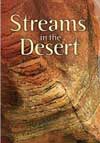
Are there not some in your circle to whom you naturally betake yourself in times of trial and sorrow? They always seem to speak the right word, to give the very counsel you are longing for; you do not realize, however, the cost which they had to pay ere they became so skillful in binding up the gaping wounds and drying tears. But if you were to investigate their past history you would find that they have suffered more than most. They have watched the slow untwisting of some silver cord on which the lamp of life hung. They have seen the golden bowl of joy dashed to their feet, and its contents spilt. They have stood by ebbing tides, and drooping gourds, and noon sunsets; but all this has been necessary to make them the nurses, the physicians, the priests of men. The boxes that come from foreign climes are clumsy enough; but they contain spices which scent the air with the fragrance of the Orient. So suffering is rough and hard to bear; but it hides beneath it discipline, education, possibilities, which not only leave us nobler, but perfect us to help others. Do not fret, or set your teeth, or wait doggedly for the suffering to pass; but get out of it all you can, both for yourself and for your service to your generation, according to the will of God. --Selected

|
|
If firstfruits are holy
Restoring My Soul (VOL1) Day 246
References: Rom 11:16 Rom 8:29 Rev 1:5 Further Study: Jer 2:3 Lev 23:20

Today we are considering the words of Paul, ‘If the firstfruits be holy, the lump is holy’. Christ, the only begotten Son, has become the firstborn from the dead, the firstfruits. He is the sheaf of the firstfruits, the ‘firstborn among many brethren’. Although we don’t see the individual seed of many sons, His resurrection included all who are planted in the likeness of His death.
Looking at the Hebrew calendar, we note eight days after the Passover, the ‘first of the firstfruits’ were presented before the Lord. This sheaf was lifted up and waved, the first of His harvest. We are included in this harvest, and yet the nature of our life as ‘certain firstfruits’ is not apparent until we are separated in the sheaf. Christ is the sheaf of firstfruits. And as Paul said, ‘If the firstfruits be holy, the lump is also’. By this means, the resurrection of Christ has sanctified each begotten son to the process of separation.
We know the Israelites presented their firstfruits as a grain or meal offering. This explains Paul’s reference to the firstfruits as the first piece of ‘dough’. He was referring to the presentation of the firstfruits upon the altar as a meal offering. Of course, this particular offering ascended to the Lord as a remembrance, not of things past, but the desire of the Father’s heart. When the lump of dough with its drink offering ascends on the altar, the Father remembers us.
Material Provided by 

|
|
Laying life down
Restoring My Soul (VOL2) Day 246
References Further Study John 15:13, 16 John 3:16 John 15 John 17:26 John 5:20 John 14:9
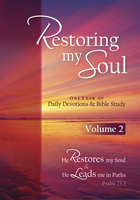
The term ‘laying down’ is not difficult to understand. Jesus was constantly
laying down His life to the disciples so that they could bring forth fruit. ‘Laying down’ is the initiative of one to give, commit, and offer their life to another so that they can express and multiply it. Jesus said, ‘Greater love has no one than this, that one lay down his life for his friends’. And three verses later He said, ‘You did not choose Me but I chose you, and appointed [laid down to] you that you would go and bear fruit’. Our English translations of the Bible say ‘appointed’, but it is literally ‘laid down’. Jesus did what He saw the Father doing. The Father laid down all His fullness to the Son so that the Son could express and multiply it. It is the love of the Father, and indeed all fathers, to lay down everything to their sons so that life can increase and multiply.
There is no doubt that Jesus ultimately laid His life down to death. However, we must remember that in so doing, He was giving His fullness to us so that we can do greater things. He became the High Priest of good things to come. Laying life down is giving and offering the way the Father offers. This is borne out in the most renowned of all Scriptures, ‘God so loved the world that He gave’. Jesus said that ‘the Father loves the Son, and shows Him all things that He Himself is doing; and the Father will show Him greater works than these’. When the Father laid down His fullness to the Son, the Father was revealed in the Son. This is why Jesus said, ‘I have made Your name known to them’, and equally, ‘He who has seen Me has seen the Father’.
Material Provided by 

|
|
The Passover and the burnt offering
Restoring My Soul (VOL3) Day 246
References Further Study 1Co 5:7 Rom 12:1 2Co 2 Num 28:4-7 2Co 2:14 Php 2:17 2Ti4:6
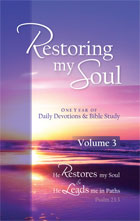
The day you believed and humbled yourself before Jesus Christ, He redeemed you by precious blood. He delivered you from the slavery of sin and made you the slave of righteousness. Nevertheless, you are not altogether free; you became a slave of righteousness. The blood of Christ our Passover Lamb has delivered us from the bondage, incarceration and captivity of sin. Of course, we are not journeying from Egypt to Palestine. We’re in a process of change from one condition to another. Christ our Passover has been sacrificed for us. Therefore, as Paul said, we are to ‘keep the feast’. We do this by presenting ourselves as living sacrifices. Just as that historic Passover lamb was made continual by the daily burnt offering, so it is with Christ. Having been offered once, Christ includes us in the process of cleansing as we offer ourselves continually. The burnt offering makes the Passover continual. When Paul said, ‘I die daily’, he was making that historic morning and evening sacrifice real and effective for himself. And all the more when he said, ‘I am being poured out as a drink offering’. As a burnt offering, you are yielding daily, presenting yourself as a living sacrifice. When you are poured out and emptied, you are a sweet aroma to the Lord. The fact of your whole person being presented is making the blood of Christ effective to deal with the fundamental condition of sin. In this way, He always leads us in triumph in Christ and manifests through us the sweet aroma of the knowledge of Him in every place. In this way, we are the fragrance and aroma of Christ to God. We can be an aroma of the knowledge of Him in every place. It is the aroma of life to life.
Material Provided by 

|
|
Dead in sin
Restoring My Soul (VOL4) Day 246
References Further Study Eph 2:11-13 2Co 4:3 Col 3 Luk 19:10 Luk 15:32 Col 3:5-9 Rom 7:5 Gal 2:16, 21 Gal 3:21 Heb 2:9 Gal 3:10
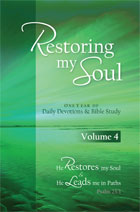
It is important to fully understand our fallen condition. We were dead in trespasses and sins, lost and without hope in this world. We had lost our sonship and we were lost to God. We were in a state of destruction and perishing. Paul said, ‘If our gospel is veiled, it is veiled to those who are perishing’. Jesus said, ‘For the Son of Man has come to seek and to save that which was lost’. Speaking of the prodigal son, Jesus said, ‘For this brother of yours was dead and has begun to live, and was lost and has been found’. We had existence but were not able to sustain life and survive. Jesus did not come to save us from dying for we were already dead. Christ came to redeem us from death. Outside of Christ, we were all sons of disobedience and children of wrath. We were people of passion, angry, seeking vengeance, coveting things we did not have, filled with strong desire, often experiencing a violent commotion of the mind. These emotions of sin are stirred up by the law and only bring forth the fruit of death in us. We take hold of the law of God to achieve our own righteousness, but we are incapable of achieving righteousness and demonstrating goodness. Because we are unrighteous, we break God’s law. Our judgement is that we suffer the punishment that belongs to that law, the sufferings of death. Suffering belongs to the process of dying and is part of the curse of the law. Our suffering and dying are the fruit of our disobedience. This suffering has no merit or virtue. It is the evidence of the curse of the law and is the harbinger of our eternal death.
Material Provided by 

|
|
 If we would value and love the Throne of Grace aright, we must try to understand what it is that it provides for our use. Scripture uses great words to reveal this grace to us. It speaks of "the riches of grace," "the glory of grace," "the abundance of grace," "the exceeding riches of grace," "the manifold riches of grace." Let these words sink deep into your hearts as we point to them in Gods Word.
If we would value and love the Throne of Grace aright, we must try to understand what it is that it provides for our use. Scripture uses great words to reveal this grace to us. It speaks of "the riches of grace," "the glory of grace," "the abundance of grace," "the exceeding riches of grace," "the manifold riches of grace." Let these words sink deep into your hearts as we point to them in Gods Word.

 為教會
為教會


 The LORD Christ in the midst of His people is to be acknowledged and obeyed. He is the vice-regent of God and speaks in the Fathers name, and it is ours implicitly and immediately to do as He commands. We shall lose the promise if we disregard the precept.
The LORD Christ in the midst of His people is to be acknowledged and obeyed. He is the vice-regent of God and speaks in the Fathers name, and it is ours implicitly and immediately to do as He commands. We shall lose the promise if we disregard the precept. Even the sweetest visits from Christ, how short they are—and how transitory! One moment our eyes see him, and we rejoice with joy unspeakable and full of glory, but again a little time and we do not see him, for our beloved withdraws himself from us; like a roe or a young hart he leaps over the mountains of division; he is gone to the land of spices, and feeds no more among the lilies.
Even the sweetest visits from Christ, how short they are—and how transitory! One moment our eyes see him, and we rejoice with joy unspeakable and full of glory, but again a little time and we do not see him, for our beloved withdraws himself from us; like a roe or a young hart he leaps over the mountains of division; he is gone to the land of spices, and feeds no more among the lilies. In Lydias conversion there are many points of interest. It was brought about by providential circumstances. She was a seller of purple, of the city of Thyatira, but just at the right time for hearing Paul we find her at Philippi; providence, which is the handmaid of grace, led her to the right spot. Again, grace was preparing her soul for the blessing—grace preparing for grace. She did not know the Saviour, but as a Jewess, she knew many truths which were excellent stepping-stones to a knowledge of Jesus. Her conversion took place in the use of the means. On the Sabbath she went when prayer was wont to be made, and there prayer was heard. Never neglect the means of grace; God may bless us when we are not in his house, but we have the greater reason to hope that he will when we are in communion with his saints. Observe the words, “Whose heart the Lord opened.” She did not open her own heart. Her prayers did not do it; Paul did not do it. The Lord himself must open the heart, to receive the things which make for our peace. He alone can put the key into the hole of the door and open it, and get admittance for himself. He is the hearts master as he is the hearts maker. The first outward evidence of the opened heart was obedience. As soon as Lydia had believed in Jesus, she was baptized. It is a sweet sign of a humble and broken heart, when the child of God is willing to obey a command which is not essential to his salvation, which is not forced upon him by a selfish fear of condemnation, but is a simple act of obedience and of communion with his Master. The next evidence was love, manifesting itself in acts of grateful kindness to the apostles. Love to the saints has ever been a mark of the true convert. Those who do nothing for Christ or his church, give but sorry evidence of an “opened” heart. Lord, evermore give me an opened heart.
In Lydias conversion there are many points of interest. It was brought about by providential circumstances. She was a seller of purple, of the city of Thyatira, but just at the right time for hearing Paul we find her at Philippi; providence, which is the handmaid of grace, led her to the right spot. Again, grace was preparing her soul for the blessing—grace preparing for grace. She did not know the Saviour, but as a Jewess, she knew many truths which were excellent stepping-stones to a knowledge of Jesus. Her conversion took place in the use of the means. On the Sabbath she went when prayer was wont to be made, and there prayer was heard. Never neglect the means of grace; God may bless us when we are not in his house, but we have the greater reason to hope that he will when we are in communion with his saints. Observe the words, “Whose heart the Lord opened.” She did not open her own heart. Her prayers did not do it; Paul did not do it. The Lord himself must open the heart, to receive the things which make for our peace. He alone can put the key into the hole of the door and open it, and get admittance for himself. He is the hearts master as he is the hearts maker. The first outward evidence of the opened heart was obedience. As soon as Lydia had believed in Jesus, she was baptized. It is a sweet sign of a humble and broken heart, when the child of God is willing to obey a command which is not essential to his salvation, which is not forced upon him by a selfish fear of condemnation, but is a simple act of obedience and of communion with his Master. The next evidence was love, manifesting itself in acts of grateful kindness to the apostles. Love to the saints has ever been a mark of the true convert. Those who do nothing for Christ or his church, give but sorry evidence of an “opened” heart. Lord, evermore give me an opened heart.
 Are there not some in your circle to whom you naturally betake yourself in times of trial and sorrow? They always seem to speak the right word, to give the very counsel you are longing for; you do not realize, however, the cost which they had to pay ere they became so skillful in binding up the gaping wounds and drying tears. But if you were to investigate their past history you would find that they have suffered more than most. They have watched the slow untwisting of some silver cord on which the lamp of life hung. They have seen the golden bowl of joy dashed to their feet, and its contents spilt. They have stood by ebbing tides, and drooping gourds, and noon sunsets; but all this has been necessary to make them the nurses, the physicians, the priests of men. The boxes that come from foreign climes are clumsy enough; but they contain spices which scent the air with the fragrance of the Orient. So suffering is rough and hard to bear; but it hides beneath it discipline, education, possibilities, which not only leave us nobler, but perfect us to help others. Do not fret, or set your teeth, or wait doggedly for the suffering to pass; but get out of it all you can, both for yourself and for your service to your generation, according to the will of God. --Selected
Are there not some in your circle to whom you naturally betake yourself in times of trial and sorrow? They always seem to speak the right word, to give the very counsel you are longing for; you do not realize, however, the cost which they had to pay ere they became so skillful in binding up the gaping wounds and drying tears. But if you were to investigate their past history you would find that they have suffered more than most. They have watched the slow untwisting of some silver cord on which the lamp of life hung. They have seen the golden bowl of joy dashed to their feet, and its contents spilt. They have stood by ebbing tides, and drooping gourds, and noon sunsets; but all this has been necessary to make them the nurses, the physicians, the priests of men. The boxes that come from foreign climes are clumsy enough; but they contain spices which scent the air with the fragrance of the Orient. So suffering is rough and hard to bear; but it hides beneath it discipline, education, possibilities, which not only leave us nobler, but perfect us to help others. Do not fret, or set your teeth, or wait doggedly for the suffering to pass; but get out of it all you can, both for yourself and for your service to your generation, according to the will of God. --Selected
 Today we are considering the words of Paul, ‘If the firstfruits be holy, the lump is holy’. Christ, the only begotten Son, has become the firstborn from the dead, the firstfruits. He is the sheaf of the firstfruits, the ‘firstborn among many brethren’. Although we don’t see the individual seed of many sons, His resurrection included all who are planted in the likeness of His death.
Looking at the Hebrew calendar, we note eight days after the Passover, the ‘first of the firstfruits’ were presented before the Lord. This sheaf was lifted up and waved, the first of His harvest. We are included in this harvest, and yet the nature of our life as ‘certain firstfruits’ is not apparent until we are separated in the sheaf. Christ is the sheaf of firstfruits. And as Paul said, ‘If the firstfruits be holy, the lump is also’. By this means, the resurrection of Christ has sanctified each begotten son to the process of separation.
We know the Israelites presented their firstfruits as a grain or meal offering. This explains Paul’s reference to the firstfruits as the first piece of ‘dough’. He was referring to the presentation of the firstfruits upon the altar as a meal offering. Of course, this particular offering ascended to the Lord as a remembrance, not of things past, but the desire of the Father’s heart. When the lump of dough with its drink offering ascends on the altar, the Father remembers us.
Today we are considering the words of Paul, ‘If the firstfruits be holy, the lump is holy’. Christ, the only begotten Son, has become the firstborn from the dead, the firstfruits. He is the sheaf of the firstfruits, the ‘firstborn among many brethren’. Although we don’t see the individual seed of many sons, His resurrection included all who are planted in the likeness of His death.
Looking at the Hebrew calendar, we note eight days after the Passover, the ‘first of the firstfruits’ were presented before the Lord. This sheaf was lifted up and waved, the first of His harvest. We are included in this harvest, and yet the nature of our life as ‘certain firstfruits’ is not apparent until we are separated in the sheaf. Christ is the sheaf of firstfruits. And as Paul said, ‘If the firstfruits be holy, the lump is also’. By this means, the resurrection of Christ has sanctified each begotten son to the process of separation.
We know the Israelites presented their firstfruits as a grain or meal offering. This explains Paul’s reference to the firstfruits as the first piece of ‘dough’. He was referring to the presentation of the firstfruits upon the altar as a meal offering. Of course, this particular offering ascended to the Lord as a remembrance, not of things past, but the desire of the Father’s heart. When the lump of dough with its drink offering ascends on the altar, the Father remembers us.

 The term ‘laying down’ is not difficult to understand. Jesus was constantly
laying down His life to the disciples so that they could bring forth fruit. ‘Laying down’ is the initiative of one to give, commit, and offer their life to another so that they can express and multiply it. Jesus said, ‘Greater love has no one than this, that one lay down his life for his friends’. And three verses later He said, ‘You did not choose Me but I chose you, and appointed [laid down to] you that you would go and bear fruit’. Our English translations of the Bible say ‘appointed’, but it is literally ‘laid down’. Jesus did what He saw the Father doing. The Father laid down all His fullness to the Son so that the Son could express and multiply it. It is the love of the Father, and indeed all fathers, to lay down everything to their sons so that life can increase and multiply.
There is no doubt that Jesus ultimately laid His life down to death. However, we must remember that in so doing, He was giving His fullness to us so that we can do greater things. He became the High Priest of good things to come. Laying life down is giving and offering the way the Father offers. This is borne out in the most renowned of all Scriptures, ‘God so loved the world that He gave’. Jesus said that ‘the Father loves the Son, and shows Him all things that He Himself is doing; and the Father will show Him greater works than these’. When the Father laid down His fullness to the Son, the Father was revealed in the Son. This is why Jesus said, ‘I have made Your name known to them’, and equally, ‘He who has seen Me has seen the Father’.
The term ‘laying down’ is not difficult to understand. Jesus was constantly
laying down His life to the disciples so that they could bring forth fruit. ‘Laying down’ is the initiative of one to give, commit, and offer their life to another so that they can express and multiply it. Jesus said, ‘Greater love has no one than this, that one lay down his life for his friends’. And three verses later He said, ‘You did not choose Me but I chose you, and appointed [laid down to] you that you would go and bear fruit’. Our English translations of the Bible say ‘appointed’, but it is literally ‘laid down’. Jesus did what He saw the Father doing. The Father laid down all His fullness to the Son so that the Son could express and multiply it. It is the love of the Father, and indeed all fathers, to lay down everything to their sons so that life can increase and multiply.
There is no doubt that Jesus ultimately laid His life down to death. However, we must remember that in so doing, He was giving His fullness to us so that we can do greater things. He became the High Priest of good things to come. Laying life down is giving and offering the way the Father offers. This is borne out in the most renowned of all Scriptures, ‘God so loved the world that He gave’. Jesus said that ‘the Father loves the Son, and shows Him all things that He Himself is doing; and the Father will show Him greater works than these’. When the Father laid down His fullness to the Son, the Father was revealed in the Son. This is why Jesus said, ‘I have made Your name known to them’, and equally, ‘He who has seen Me has seen the Father’.
 The day you believed and humbled yourself before Jesus Christ, He redeemed you by precious blood. He delivered you from the slavery of sin and made you the slave of righteousness. Nevertheless, you are not altogether free; you became a slave of righteousness. The blood of Christ our Passover Lamb has delivered us from the bondage, incarceration and captivity of sin. Of course, we are not journeying from Egypt to Palestine. We’re in a process of change from one condition to another. Christ our Passover has been sacrificed for us. Therefore, as Paul said, we are to ‘keep the feast’. We do this by presenting ourselves as living sacrifices. Just as that historic Passover lamb was made continual by the daily burnt offering, so it is with Christ. Having been offered once, Christ includes us in the process of cleansing as we offer ourselves continually. The burnt offering makes the Passover continual. When Paul said, ‘I die daily’, he was making that historic morning and evening sacrifice real and effective for himself. And all the more when he said, ‘I am being poured out as a drink offering’. As a burnt offering, you are yielding daily, presenting yourself as a living sacrifice. When you are poured out and emptied, you are a sweet aroma to the Lord. The fact of your whole person being presented is making the blood of Christ effective to deal with the fundamental condition of sin. In this way, He always leads us in triumph in Christ and manifests through us the sweet aroma of the knowledge of Him in every place. In this way, we are the fragrance and aroma of Christ to God. We can be an aroma of the knowledge of Him in every place. It is the aroma of life to life.
The day you believed and humbled yourself before Jesus Christ, He redeemed you by precious blood. He delivered you from the slavery of sin and made you the slave of righteousness. Nevertheless, you are not altogether free; you became a slave of righteousness. The blood of Christ our Passover Lamb has delivered us from the bondage, incarceration and captivity of sin. Of course, we are not journeying from Egypt to Palestine. We’re in a process of change from one condition to another. Christ our Passover has been sacrificed for us. Therefore, as Paul said, we are to ‘keep the feast’. We do this by presenting ourselves as living sacrifices. Just as that historic Passover lamb was made continual by the daily burnt offering, so it is with Christ. Having been offered once, Christ includes us in the process of cleansing as we offer ourselves continually. The burnt offering makes the Passover continual. When Paul said, ‘I die daily’, he was making that historic morning and evening sacrifice real and effective for himself. And all the more when he said, ‘I am being poured out as a drink offering’. As a burnt offering, you are yielding daily, presenting yourself as a living sacrifice. When you are poured out and emptied, you are a sweet aroma to the Lord. The fact of your whole person being presented is making the blood of Christ effective to deal with the fundamental condition of sin. In this way, He always leads us in triumph in Christ and manifests through us the sweet aroma of the knowledge of Him in every place. In this way, we are the fragrance and aroma of Christ to God. We can be an aroma of the knowledge of Him in every place. It is the aroma of life to life.
 It is important to fully understand our fallen condition. We were dead in trespasses and sins, lost and without hope in this world. We had lost our sonship and we were lost to God. We were in a state of destruction and perishing. Paul said, ‘If our gospel is veiled, it is veiled to those who are perishing’. Jesus said, ‘For the Son of Man has come to seek and to save that which was lost’. Speaking of the prodigal son, Jesus said, ‘For this brother of yours was dead and has begun to live, and was lost and has been found’. We had existence but were not able to sustain life and survive. Jesus did not come to save us from dying for we were already dead. Christ came to redeem us from death. Outside of Christ, we were all sons of disobedience and children of wrath. We were people of passion, angry, seeking vengeance, coveting things we did not have, filled with strong desire, often experiencing a violent commotion of the mind. These emotions of sin are stirred up by the law and only bring forth the fruit of death in us. We take hold of the law of God to achieve our own righteousness, but we are incapable of achieving righteousness and demonstrating goodness. Because we are unrighteous, we break God’s law. Our judgement is that we suffer the punishment that belongs to that law, the sufferings of death. Suffering belongs to the process of dying and is part of the curse of the law. Our suffering and dying are the fruit of our disobedience. This suffering has no merit or virtue. It is the evidence of the curse of the law and is the harbinger of our eternal death.
It is important to fully understand our fallen condition. We were dead in trespasses and sins, lost and without hope in this world. We had lost our sonship and we were lost to God. We were in a state of destruction and perishing. Paul said, ‘If our gospel is veiled, it is veiled to those who are perishing’. Jesus said, ‘For the Son of Man has come to seek and to save that which was lost’. Speaking of the prodigal son, Jesus said, ‘For this brother of yours was dead and has begun to live, and was lost and has been found’. We had existence but were not able to sustain life and survive. Jesus did not come to save us from dying for we were already dead. Christ came to redeem us from death. Outside of Christ, we were all sons of disobedience and children of wrath. We were people of passion, angry, seeking vengeance, coveting things we did not have, filled with strong desire, often experiencing a violent commotion of the mind. These emotions of sin are stirred up by the law and only bring forth the fruit of death in us. We take hold of the law of God to achieve our own righteousness, but we are incapable of achieving righteousness and demonstrating goodness. Because we are unrighteous, we break God’s law. Our judgement is that we suffer the punishment that belongs to that law, the sufferings of death. Suffering belongs to the process of dying and is part of the curse of the law. Our suffering and dying are the fruit of our disobedience. This suffering has no merit or virtue. It is the evidence of the curse of the law and is the harbinger of our eternal death.